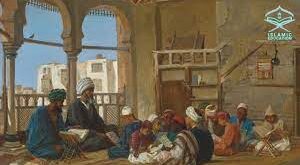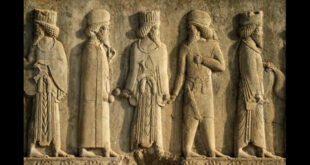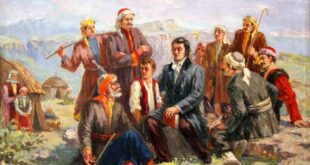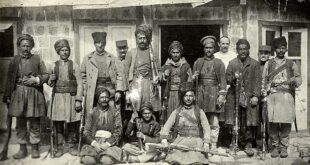Brief History
The Kurds are, together with the Arabs, Persians, and Armenians, one of the most ancient peoples of the Near East. The country they inhabit is called Kurdistan. The Kurds have their own language, Kurdish. Kurdish is a member of the Indo-European family of languages; like Persian, Afghan, and Beluchi, it is one of the Iranian languages. Kurdish is unrelated to the Arabic or Turkish languages. Perceived as posing a separatist threat and without any formal representation on the world stage, they have been subject to genocide, crimes against humanity and a host of other human rights abuses.
Many of the Kurds’ problems emerged from the aftermath of the First World War. Following the collapse of the Ottoman Empire, the regional powers signed a peace treaty – the Treaty of Sèvres – envisaging, among other provisions, the future establishment of an independent Kurdish state. However, following the Turkish war of independence under Mustafa ‘Kemal’ Atatürk and his followers, the Treaty of Lausanne was enacted instead. That treaty sidelined the Kurdish question altogether and finalised the division of the Kurdish regions between modern-day Turkey, Iraq, Iran and Syria. Kurdish culture stems back to the migration of indo-European tribes some 4,000 years ago to the Zagros Mountains, now the heart of the Kurdish region. Although no formal censuses exist, there are estimated to be 40 million Kurds originating from the mountainous region bordering modern Turkey, Iraq, Iran and Syria. Despite their cross-border spread and the large number of different languages and religions, Kurds share a strong overarching sense of identity.
The geopolitical importance of the region combined with significant oil and water resources there always appears to have hindered, not helped, the Kurds. The issues faced by Kurds in each country vary in nature and intensity, but there are undeniably common threads. In almost all regions, Kurds face suspicion of harbouring separatist sympathies simply by virtue of their ethnic origin. Ethnic cleansing programmes, ‘Arabisation’ and ‘Turkification’, have been implemented, accompanied by mass killings, displacement and prohibitions on Kurdish culture and language. Over the last twenty years, the Kurdish regions have been the scenes of genocide, crimes against humanity, extra-judicial killings, torture, mass displacement and censorship, among other abuses of international law.
Today, millions of Kurds live as internally displaced persons within state borders – physically prevented from returning to their former land and livelihoods following armed conflict. Millions more live as migrants, refugees and asylum seekers across the world.
The Kurds
Iran
There are around 10 million Kurds in Iran. Discrimination against mainly Sunni Kurds in Shi’a Iran is occasionally more complex than elsewhere because of the added religious dimension, and the fact that Kurds have often been more actively involved in resistance against the regime than other groups. State motives for repression of Kurds are, therefore, often based on ‘security’ as much as other factors.
With the world’s scrutiny of Iran focussed on the nuclear issue, these security forces have stepped up attempts to ensure the ‘integrity of the republic’ by policing in an ever-harsher manner exemplified by the torturing to death in 2006 of a 17 year old Kurdish civilian in Sanadaj police station. Incidences of executions, extrajudicial killings and ‘disappearances’ have increased while human rights defenders and NGOs have been subject to ongoing harassment.
Iraq
There are around 5.5 million Kurds in Iraq. The fall from power of Saddam Hussein in Iraq in 2003 has presented a new opportunity for the Kurds of Iraq to tackle the discrimination they have faced in the past, although Saddam’s recent flawed trial and subsequent execution mean he will never face justice for the 182,000 Kurds killed in Anfal in 1988. True justice for the victims of Anfal requires proper care and redress for the thousands of families who continue to suffer the psychological, social, economic and political effects of the genocidal campaign.
Politically, the two main Kurdish parties have united to form a single Kurdistan Regional Government – a significant step towards stability and progress. However, continuing insurgency and violence continue to threaten this success, with particularly fierce disputes over the future status of Kirkuk prompting threats of military intervention from Turkey. Ultimately, such tension diverts attention and resources into security and away from human rights and civil issues.
Syria
Human rights abuses against Syria’s million-strong Kurdish population are serious and ongoing. The refusal of the State to reinstate citizenship to 360,000 Kurds who were stripped of it in 1962 is among the most pressing problems.
The continuing state of emergency, now in place for 41 years, has also allowed the government to enforce a harsh security regime. Detention without trial, torture, and curbs on freedom of expression are particularly serious, with signatories of documents calling for greater rights arrested and imprisoned. Campaigners for better relations with Lebanon are also persecuted, as are human rights and NGO workers.
Turkey
Turkey continues to systematically abuse the human rights of its estimated 25 million-strong Kurdish population. Violence and discrimination are regularly used against Kurds despite hopes that the EU accession process might encourage Turkey to improve their situation.
Major abuses by Turkey include torture and the employment of armed forces against civilians. The state generally refuses to account for fatalities and injuries it causes – this trend has been highlighted by the recent overturning of jail sentences for military officers implicated in the bombing of a Kurdish bookshop.
Freedom of expression has been particularly targeted, with many prosecutions brought against those expressing peaceful opinions. Language rights are also restricted, with technical requirements in the curriculum being introduced to make the task of teaching in Kurdish more difficult in the private schools where it is allowed.
More worrying are the conditions set out in new anti-terror legislation such as the wide definition of ‘terrorist’, the permission given to officers to use weapons ‘without hesitation’ and the decision to allow suspects to be held ‘incommunicado’ for 24 hours. These regulations give the Turkish state wide scope to arrest, prosecute or shoot ‘undesirables’ and remain within the law. Although the legislation does not meet international human rights standards.
In fact, Turkey’s progress on human rights issues has become largely overshadowed in the EU accession process by European domestic concerns such as the ratification of the proposed constitution and efforts to prevent Cyprus derailing the process. Combined with the desire of many EU officials to stress the potential benefits of Turkish membership to a sceptically public, this lack of focus seriously diminishes the value of the EU accession process to human rights in Turkey.
Kurds in Caucasus
There are an estimated 75,000 Kurds (1.8% of population) in the Republic of Armenia. Whilst the capital, Yerevan, has been considered a centre for Kurdish culture and the arts, conflict with neighbouring Azerbaijan has seen the expulsion of Muslim Kurds and abuses against the small indigenous Kurdish population caught up in the fighting between Armenia and Azerbaijan over the disputed enclave of Nagorno-Karabakh.
There are an estimated 200,000 Kurds (2.8% of population) in the Republic of Azerbaijan. Azerbaijan’s treatment of its Kurdish population is largely affected by its conflict over the disputed enclave of Nagorno-Karabakh. There are estimated 40,000 Kurds (0.9% of population) in the Republic of Georgia.
Kurds in Europe
The formation of a Kurdish Diaspora in Europe is a recent phenomenon. In the 1960s, Kurds from Turkey began arriving in Germany. the Benelux countries, Austria, Switzerland and France as immigrant workers under contracts based on inter-government agreements regarding immigrant labor. Following the Islamic Revolution in Iran in 1979, the Army coup d’état in Turkey in 1980 and the Iraqi regimes long drawn out and murderous extermination campaign against the Kurds (Anfal), successive waves of Kurdish political refugees arrived in Western Europe and, to a lesser extent, North America. The campaign, launched in 1992, of forced evacuation and destruction of Kurdish villages, coupled with a policy of political assassination of Kurdish elites by Turkish “death squads” and paramilitary forces, followed by the inter-Kurdish clashes in Iraqi Kurdistan after 1994, have increased the Kurdish exodus to Europe.
No precise and reliable census of the Kurdish Diaspora in Europe has been recently carried out, but the most widely accepted estimates set their number at about 850,000 in Western Europe, distributed as follows:
Germany: 500,000-600,000;
France:100.000-120.000;
Netherlands:70.000-80.000;
Switzerland:60.000-70.000;
Belgium:50.000-60.000;
Austria: 50.000-60.000;
Sweden: 25.000-30.000;
UK: 20.000-25.000;
Greece: 20.000-25.000;
Denmark: 8.000-10.000;
Norway: 4.000-5.000;
Italy: 3.000-4.000;
Finland: 2.000-3.000
There are also about 15.000 to 20.000 Kurds in the United States and over 6.000 in Canada and 10.000 in Australia.
Natural Resources, Economic and Social Structures
With regard to its mineral resources, Kurdistan is one of the wealthiest countries in the world. Most of the zone extending from the Zagros mountain range to the Mediterranean, which has been known as the “Fertile Crescent” since early times, falls within Kurdistan.
Kurdistan is rich in agriculture. The plains between the mountain ranges, especially in the warm south, are well-suited to agriculture because of the composition of their soil and their favorable climatic conditions. The plateaus and mountain slopes have extremely fruitful meadowland. All types of grain, as well as high-quality fruit and vegetables, grow in the soil of Kurdistan. The Harran Plateau and the areas around Cezire and Mossul are grain reservoirs for the entire region.
Differences in temperature and elevation between the north and the south have resulted in the fact that Kurdistan has always been an important country for animal husbandry. Furthermore, Kurdistan is a reservoir of meat, butter, cheese, wool, and animal hides for the Middle East.
With regard to deposits of petroleum and other minerals, Kurdistan is a very wealthy country. A large part of Iraq’s oil resources is in Kurdistan, in the regions around Kirkuk and Xaneqin. A part of the important oil resources of Iran is also in Kurdistan, in the region around Kirmanshah. Turkey’s oil resources are almost exclusively in Kurdistan (in the regions around Batman, Diyarbakir, and Adiyaman). Syria’s oil resources are also mainly in Kurdistan, in the region around Cezire. Moreover, our land is rich in mineral resources such as iron, copper, chrome, coal, silver, gold, uranium, and phosphates.
Furthermore, there are rivers in Kurdistan that are at least as important, if not more important, than oil. The plateaus and mountains of Kurdistan, which are characterized by heavy rainfall and in winter a heavy coat of snow, are a water reservoir for the Near and Middle East. This is the source of the famous Tigris and Euphrates Rivers as well as numerous other smaller rivers. With their water, the Tigris and the Euphrates give life not only to the Mesopotamian plain and the southern part of Kurdistan but also to Iraq and Syria. These rivers, which flow down from heights of three to four thousand meters above sea level, are also very significant for the production of energy. Iraq and Syria have built numerous dams across these rivers and their tributaries. But the most important ones are a series of dams that were built by Turkey as part of the GAP project (Southeast Anatolia Project). The GAP project is still not complete, but it already supplies a significant proportion of Turkey’s electrical-energy needs. When the project is finished, both the production of electricity and agricultural production, through the irrigation of this part of Kurdistan, will increase manyfold.
Strategic location of Kurdistan
In antiquity and the Middle Ages, Kurdistan lay on the trade route between the Far East and Europe (the Silk and Spice Route). In recent history as well, this significance has continued. Interestingly enough, Kurdistan is today the most suitable region for the petroleum pipelines of Iraq and the Caucasus.
Kurdistan’s extraordinary wealth and its strategic location are the most important reasons why our country is still divided and our people still subjected to so much suffering. For the abovementioned reasons, Kurdistan drew the attention of the Western colonizing states in the eighteenth and nineteenth centuries. The English, the French, and the Russians struggled for control over our country. Then, after World War I, they once again divided it up according to their own interests.
The Russians pulled out of the region after the October Revolution of 1917. The English and the French left the region as administrators after Syria and Iraq became independent. But their economic relations and their influence continue to exist in the region.
For these reasons, our people must live in poverty in this wealthy country. The colonial conditions, the constant insecurity, and the war have prevented our country from developing its agriculture, trade, or industry. The capital that has been gained in Kurdistan has always flowed out of our country. The society has not been able to modernize, and the feudal social structures of the past have not been dissolved totally. The tribal social structure in the rural areas, the system of large-scale land ownership, the religious sects and the sheikdom associated with it have persisted. Even today, Kurdistan is ruled by a semi-feudal social system. There is no significant bourgeoisie or working class in the modern sense in its social system.
The Kurdistan National Congress – Kongra Netewiya Kurdistan (KNK)
Significance, Nature, Objectives and Strategy of the KNK
The Kurdistan National Congress (Kongra Netewiya Kurdistan, KNK) proclaimed in Amsterdam on May 24, 1999, in the presence of 700 Kurds and guests, was created to incarnate the moral unity of the Kurdish nation, without ignoring, however, the division of Kurdistan between four states; to bring remedy to disunion or conflict between Kurdish political parties; to elaborate norms of solidarity and a concerted strategy for democratic solution to the Kurdish question within the existing states, and, last but not least, to work on the national and international level, for the promotion and the ultimate practice by the people of Kurdistan of their right to self-determination.
The decision to cross the bridge
The KNK Preparatory Committee, after four years work, discussion and hesitation, took finally the decision to cross the bridge, at a moment when the Kurdistan national cohesion was higher than ever. That was consecutive to an international conspiracy against the PKK uprising and its head Abdullah Ocalan , who was abducted in February 1999 as the chief of a “terrorist” organization and treacherously handed to Turkey. The Kurdish national question was thus unjustly reduced into the dimension of a vulgar criminal affair. These event provoked large and angry demonstrations in the four parts of Kurdistan and the Kurdish diaspora across the world. Evidence was given to the international community that the Kurds are a nation in the making.
The creation of the KNK
The creation of the Kurdistan National Congress was badly needed over decades. It represents a major political event in the contemporary history of the Kurds, the world’s largest stateless nation, and on the political stage of the area. That was one of the objectives of the Kurdistan Parliament in Exile. This objective having been attained, with a much larger Kurdish representation for the Congress, the Parliament dissolved itself on September 26, 1999. For the first time in their history, the Kurdish people in the four parts of divided Kurdistan, the Kurdish diaspora in Russia and former UDSSR, Europe, North America, Australia and the Arab world, the Kurds in their different religions (Sunni, Alevi and Shii Muslims, Ezidis, Ahle-Haq, Christians), in all their dialects (North- and South Kurmanci, Zazaki, Gorani, Hawrami, Faili), as well as the Assyro-Chaldean people native of Kurdistan, are represented in one nationwide organization.
The Kurds are one nation
The KNK could be perhaps the best compared with the ANC of the time of Apartheid, or with the PLO prior to the Oslo agreement. But it is not a military organization, nor a new political and national organization, based on democracy. It works by peaceful means, diplomatic and educational.
In the preamble of the KNK’s charter, it is proclaimed:” The Kurds are one nation”. The preamble also adds: ”This charter has been formulated to safeguard the Kurds’ national identity, to consolidate their will of national unity, and of self-determination. It is based on their adherence to the principles enshrined in the Universal Declaration of Human Rights (…) and the right of all peoples to self-determination”. Emphasis is put again on this right in Article 4 and 5.
Definition of Kurdistan
Article 2 defines Kurdistan and the people of Kurdistan. Article 2 a says:” Kurdistan is the country of all Kurds, of no matter which religion, sect or dialect, who are settled there or native of. It is composed of all the contiguous regions where the Kurds from the majority of the population. Kurdistan is one country, but divided artificially”. Art. 2b:” The demographic changes in Kurdistan brought about by the policy of ethnic cleansing, forced deportation and the settlements of other elements by the occupying states are illegal and unacceptable”; Art.2c:” The people of Kurdistan are composed of: 1- the Kurds; 2- the Assyro-Chaldeans, Armenians, Turkmans, and others who have historically resided there and who accept themselves as part of the people of Kurdistan”; Art.3b:” Kurdish is the official language in Kurdistan”; Art 3c:”Those who are not Kurds among the people of Kurdistan have the right to preserve their own national particularity, to develop freely their own language and culture, and to create their own educational institutions”: and Art.: 3e:”In the areas where the Assyro-Chaldeans form the majority, their language will be officially used alongside the Kurdish language”. The expression “occupying states” (of Kurdistan) is to be noticed.
The Right of self-determination
In Article 5 we find norms and principles. Article 5b reads: ”The division of Kurdistan was against the will of its people, and against their right to self-determination”; Art. 5c:”The interests of the people of the whole Kurdistan are above those of each separate part of Kurdistan and of the Kurdish political parties”; Art. 5d:” No political party or individual has, for any reason whatsoever, the right to co-operate with any occupying states, or any other states, against the interests of the Kurdish nation”; Art. 5e:”The Congress considers as treason any co-operation with occupying states opposed to the Kurdish national movement”; Art. 5f:”The Congress rejects and condemns all forms of armed conflicts between political parties of other organizations in Kurdistan”.
Inter-Kurdish Relations
In the long Article 6 the Congress says substantially it will strive to settle internal problems between Kurdish political parties, and “try to resolve the problems and conflicts between the people of Kurdistan and the neighboring countries in an peaceful and amicable way’. It “regards the use of force as illegal except for the protection of the national rights and the national identity of the people of Kurdistan” (Art. 6e). “The Congress pledges its support for the national liberation movement and considers its duty to find peaceful political solution to the Kurdish question in all parts of Kurdistan i.e Turkey, Iran, Iraq and Syria” (Art. 6f). “The Congress as the representative of the Kurdish people, will strive to ensure the recognition of the rights of the people of Kurdistan within the international community. It will cooperate with all the political parties of Kurdistan to achieve this” (Art. 6g); “The Congress will seek to establish good relations between the people of Kurdistan and the Arabs, the Turks, the Persians, and with all other peoples worldwide” (Art. 6h), etc.
Representations of the KNK
Article 25, the last, reads :”The Congress and its organs will be temporarily based in the city (… of Brussels, as it was to be decided) until such time as it can move to Kurdistan.” Article 1st of the Charter proclaims: “The Kurdistan National Congress is the highest political organization in Kurdistan”…..
The Kurdistan National Congress has its headquarter in Brussels as well as representations in Stockholm, London, Berlin, Paris and Arbil (Iraqi Kurdistan).
KNK’s political position: There is a need for a new Middle East
There is a need for a Democratic Middle East where the monarchies, dictatorships are overcome, where the faiths and societies can freely coexist, and where the principles of society are based on ecological, democratic and gender freedom values.
Although some people may benefit form the preservation of the current status quo, the Kurds have no benefit from this status quo. The democratic changes in the region will mean freedom and revival for the Kurds. Therefore the Kurds, with their population of 40 million people, are among those who support the idea of change most. Throughout the history, including their rebellions against the Arab, Turkish and Persian dominance, the Kurds have gained very strong political, organisational and military warfare experience also through their tradition of struggle for national liberation since 1970s. Because the Kurds waged a struggle of sociological renewal as well as the struggle for national liberation under the disadvantageous conditions of war, therefore they represent an active and powerful society with political consciousness in Turkey, Iran, Iraq and Syria. Despite all the oppression, our people have set up their own non-governmental civil society organisations and they are able to express and represent themselves within these organisations.
The Kurds, represent a great power of change and democracy in Turkey, Iran, Iraq and Syria. Kurdistan is a vast country in between those countries with its oil and water reserves and many other natural resources. Its wealth of natural resources and its close distance to other fields of energy resources and its location on the energy routes as well as its young and dynamic population have increased its strategic importance.
Kurds as a power of democratic changes in Middle East
Kurdish society, an important part of the regional structure, has been the most disadvantaged under the dominant regional system. Its social and cultural existence has been denied for many years, and is still not adequately acknowledged in the international arena. The inalienable rights of the Kurds are suppressed, and their claims to free cultural and political development are not tolerated. Kurds are practically exempted from the fundamental rights and freedoms that international bodies like the United Nations or the European Union would espouse as universal, and systematic violations of their rights are being flagrantly ignored. Although the right to self-determination, including separation, is granted to all nations and peoples under international law, the Kurds still suffer the prohibition of the use of the use of their language. Expressly democratic actions and most basic demands made by the Kurds are still branded as separatism.
It is clear that the Kurds cannot continue suffering the denial of their rights, repression, deportations and anfal campaigns, and what amounts to warfare against them. There is no alternative to achieving a clear leap forward in the fields of democracy, fundamental rights and freedoms. While this holds true for all the peoples and communities in the Middle East, it is especially critical for the Kurds. The only solution is a new, vigorous advance in contemporary democracy. Weakened by continuous subjection to violent repression and poverty, the social structure of the Kurds can only be regenerated by embracing democracy and recognising its rights. As a result of their successful struggle and their strong commitment to democracy, the Kurdish people can play an important part in the overall democratisation of the Middle East.
 History of Kurdistan
History of Kurdistan




